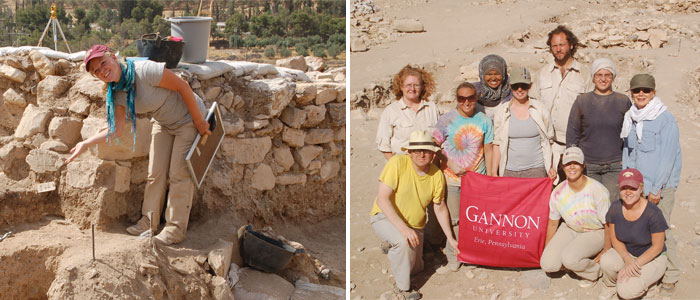
Expedition Forms
We should have all forms close to March 1, 2019, but preferably much earlier since there is a limit on the number of volunteers we can accept. Camp fee for volunteers: $2,750 for entire season--room & board; weekly rate for less than full-time.
Minimum length of stay for volunteers is 10 days - two weeks. Airfare is not included in the price, but we will help you to find a good flight over to Jordan. There will be optional weekend trips, such as Petra/Wadi Rum and Jerash to acquaint you with the exotic culture of Jordan. If there is enough interest in an optional after-dig trip, the staff will organize it. Volunteers will be housed in a delightful hotel in the nearby town of Madaba with swimming pool and within walking distance of downtown. All meals and transportation (except for individual touring) are covered by the camp fee. There are three academic credits offered for the field school, at a cost of $690/credit from Gannon University.
The expedition is led by Principal Investigator and and Co-Director, Dr. Suzanne Richard (Gannon University) and co-directors, Dr. Jesse. C. Long, Jr. (Lubbock Christian University) and Dr. Marta D'Andrea, La Sapienza, University of Rome; Professor Bill Libby of McMurry University is coordinator. For more information, please contact Dr. Suzanne Richard at Gannon University, 109 University Square, Erie, PA 16541, (814) 871-5605; email: richard002@gannon.edu; fax: (814) 871-7652.
This coming expedition promises to be exciting as we continue to expose more of the important urban Early Bronze Age III settlement, continue to excavate the multiple phases of fortifications, and revisit the unique Early Bronze IV Ara C "Gateway." Some important finds in past seasons: the only EB IV gate and one of the earliest bronze spearheads in the southern Levant; a range of artifacts and restorable vessels from multiple destruction levels, along with multi-phased fortifications surrounding the site.
Khirbat Iskandar is situated on the famous caravan route, the King’s Highway, east of the Dead Sea in the Plains of Moab. Excavations have revealed occupation spanning virtually the entire Early Bronze Age (3700-1930 BCE). Khirbat Iskandar is unique since it appears to continue urban traditions following the collapse of urban life at the end of EB III. It is one f the few sites in the southern Levant to include an extensive and well-preserved multiphase EB IV settlement on the "tell" which, combined with megaliths and cemeteries, as well as a "High Place" reveals a complex society and a territory far larger than the 8 acre main "tell" might indicate.